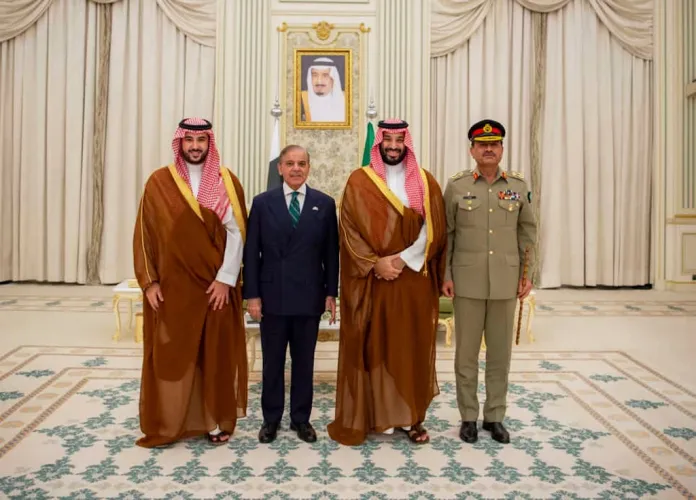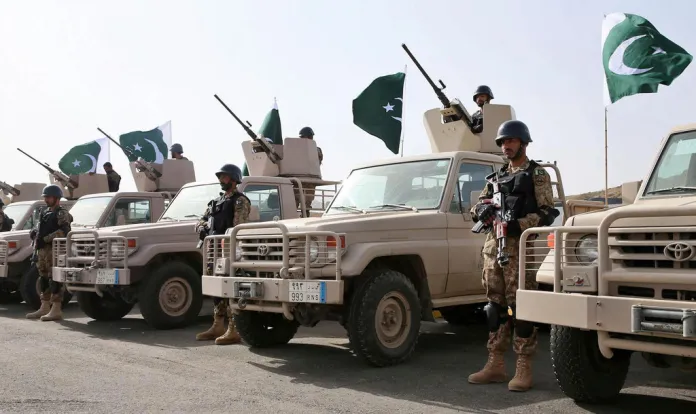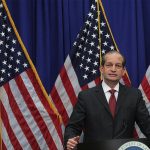Saudi Arabia has inked a pact of mutual defense with Pakistan, establishing that an act of aggression against either nation will be seen as aggression against both.
Prince Mohammed bin Salman and Prime Minister Muhammad Shehbaz Sharif signed the “Strategic Mutual Defense Agreement” in the capital city of Riyadh on Thursday.
“This agreement reflects the shared commitment of both nations to enhance security and to achieve security and peace in the region and the world,” the government of Pakistan said of the agreement. “It aims to develop aspects of defense cooperation between the two countries and strengthen joint deterrence against any aggression.”

The agreement, based in “bonds of brotherhood and Islamic solidarity” and benefiting “shared strategic interests,” comes after Israel’s recent strike on neighboring Islamic nation Qatar.
The Israel Defense Forces fired an unprecedented strike at the Qatari capital of Doha last week that aimed to kill a gathering of Hamas officials. The unilateral bombing failed to kill all of its targets and infuriated both Israel’s allies and enemies — including the United States.
Pakistan was among the many Islamic nations to issue condemnations of the Doha strikes.
“This unjustifiable and unprovoked attack constitutes a dangerous escalation threatening the very foundation for the enjoyment of all human rights by all peoples in the region, as well as an attack on the sovereignty, security, and territorial integrity of the State of Qatar under the pretext of countering terrorism,” the Pakistan representation at the United Nations said on Tuesday.
Saudi Arabia’s decision to formalize joint security with Pakistan, an Islamic country that maintains a nuclear umbrella that can cover the kingdom, changes the calculus of regional security in the Middle East.
“[The recent attacks] have exacerbated security anxieties of the Gulf states while jeopardising confidence in the US security umbrella as the ultimate shield. As Gulf states look to bolster their security, regional countries such as Pakistan, Egypt, and Turkey emerge as natural partners,” University of Technology Sydney security researcher Muhammad Faisal told Al Jazeera.
Saudi Arabia and Pakistan have already enjoyed a productive relationship in the realm of military preparedness, swapping manpower and expertise as far back as the Iran–Iraq War. But the Thursday agreement both formalizes and equalizes this cooperation.
The U.S. has traditionally been expected to act as a security guarantor and mediator between Middle East Islamic states and Israel, but reports that the White House knowingly allowed the strike to go ahead have damaged trust.
This new agreement has been interpreted by the Israeli press as a signal that the Saudis are exploring alternative options outside the U.S. sphere of influence for their long-term security.
Qatari Prime Minister Sheikh Mohammed bin Abdulrahman al Thani was furious following the Doha incident, urging “retaliation from the whole region in the face of those barbaric actions.”

“[The strike] reflects the barbarism of this person that is leading the region, unfortunately, to a point where we cannot address any situation and we cannot repair anything, and we cannot work within the frameworks of international laws.”
The White House has tried to smooth things over with the Qataris since the incident, with President Donald Trump meeting with Thani on Friday in New York — which the prime minister called a “great dinner.”
Secretary of State Marco Rubio has also played clean up following the incident, heading to Doha after a stopover in Israel and claiming his team was on the “verge of finalizing” an “enhanced defense cooperation agreement” with the Qataris.
TRUMP AND RUBIO AIM TO SMOOTH THINGS OVER WITH QATAR AFTER ISRAELI STRIKE
“This (Israeli) attack, of course, expedites the need for a renewed strategic defence agreement between us and the United States. It’s not something new per se, but certainly expedited,” Qatari foreign ministry spokesman Majed Al Ansari said this week.
Cooperation with Doha is a major priority for U.S. security, as Qatar hosts the U.S. military’s largest base in the Middle East.























